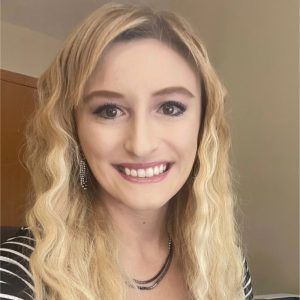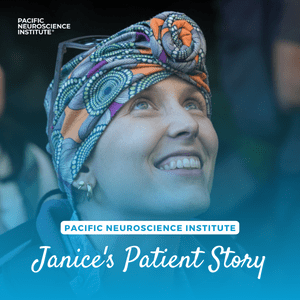**Sponsored by Pacific Neuroscience Institute: This content is not an endorsement from the ABTA.**

In the heart of the White Mountains, Janice Armbrust and Jeff Ramos embarked on a challenging hike with four friends along New Hampshire’s Pemi Loop, a 33-mile trek known for its steepness and difficulty. Despite the risks associated with mid-October weather, they were seasoned adventurers prepared for the rugged terrain. Halfway through the hike, they encountered horizontal rain and hurricane-force winds that forced them to seek shelter.
With drenched supplies and failed phones, they huddled together through the night, facing the intensity of the elements. It was a seemingly unsurmountable challenge that the couple overcame together. A few years later, they would need to face another significant hurdle. Janice, still in her twenties, was diagnosed with glioblastoma, a particularly aggressive brain cancer.
Leveraging her past outdoor adventures, she took on this diagnosis with unwavering resilience.
“My mantra outdoors has always been: Slow and steady, one step after the next,” Janice shared. “Likewise, in this type of situation, you can’t think of the mountain or the big challenge ahead. You have to focus on the next step and take it a day at a time. Otherwise, you’ll get discouraged, and you might forget to appreciate the beautiful views right in front of you.”
Under the guidance of Dr. Akanksha Sharma, Neuro-oncologist and Palliative Care Specialist at Pacific Neuroscience Institute® (PNI®), Janice enrolled in a groundbreaking clinical trial for Optune, an innovative treatment involving Tumor Treating Fields (TTF). The revolutionary therapy employs external arrays worn on the head, emitting electrical fields that effectively slow tumor growth.
Notably, these fields target actively dividing tumor cells while sparing healthy cells. Dr. Sharma emphasizes the extensive research and rigorous clinical trials that have demonstrated the safety and efficacy of Optune. According to Dr. Sharma, “the initial data showed that it helped patients in terms of improving their survival significantly when they were diagnosed with glioblastoma. And so, it is approved, it is safe, it does not affect healthy brain tissue.”
Through these challenges, Janice learned to strike a balance between treatment and personal enjoyment, finding ways to pursue fulfillment while managing her health. Janice now excels in her fast-paced role in consulting. Beyond her professional success, she enjoys each day — walking her dog, spending quality time with her husband, and pursuing new travel adventures.
“My advice to anyone? Do what Janice is doing. Experience as much as you can. I can visualize her on the mountain so clearly, and she’s the same way in life: She trudges forward, she doesn’t take breaks, she just goes for it. I’m in awe of her.”
–Jeff, Janice's husband
PNI applies a comprehensive approach to healthcare, recognizing the significance of maintaining one’s quality of life during treatment. Our neuro-oncologists are at the forefront of applying brain tumor genomics to developing personalized treatments, including the evaluation of clinical trial eligibility. We offer focused therapies and advanced treatment options that may not be available elsewhere.
In addition, PNI provides valuable resources to patients and their families, including a clinic dedicated to supportive care and support groups for those affected by brain tumors. We aim to improve both the overall quality of life and longevity by offering these services. With the guidance of renowned specialists like Dr. Sharma, patients like Janice can have confidence that they are receiving exceptional care for their condition.
Learn more about the future of brain tumor treatment at PNI: Click here or call 310-582-7450.

Jessie Schlacks
Jessie is Managing Editor of the bi-monthly e-newsletter MindMatters. Submit story ideas or questions to jschlacks@abta.org.




















